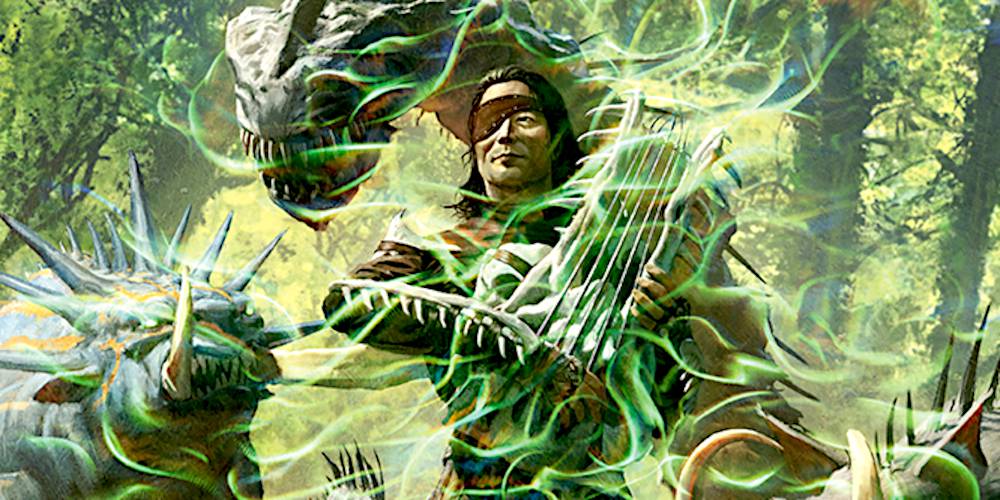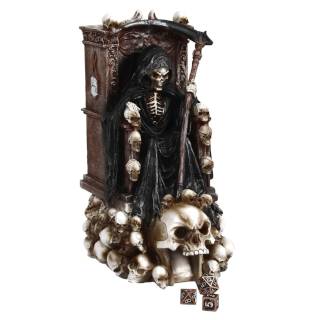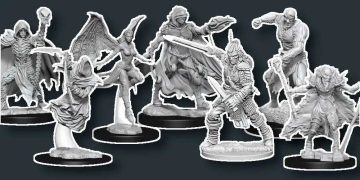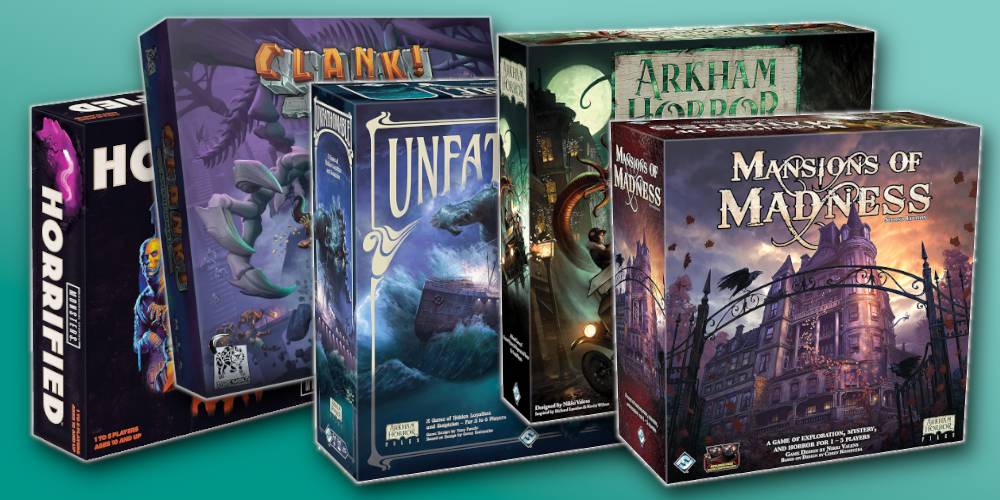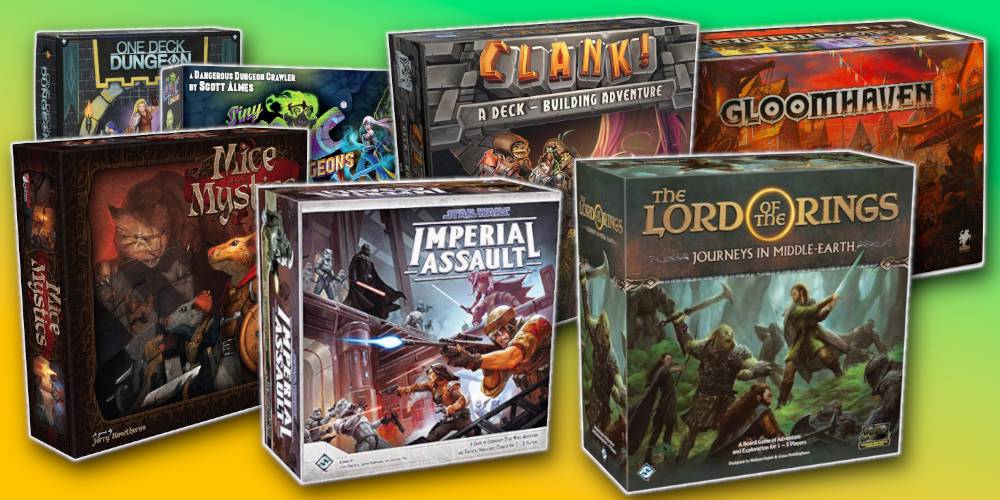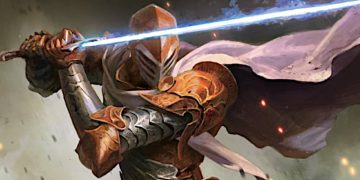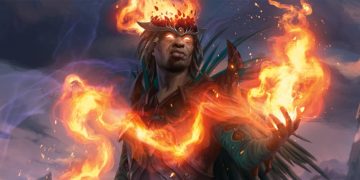Tip 1: Consider Your Party When Picking Spells
Bards have the flexibility to fill almost any role in a given party, and that flexibility comes fromhow you pick your spells.
For example, Bards get access to spells likeHealing Wordstarting at 1st Level, which can restore party members and get them back on their feet, allowing you to fill in for a missing healer.
On the other hand, if your party doesn’t have an arcane caster in the mix, your Bard can takeIdentifyat 1st Level so you’re always able to correctly identify any magical items you come across.
Many other Bard spells are focused on extra utility for the party—like providing buffs to allies and debuffs on enemy encounters—so be sure to pick the right ones for your party makeup.
For example, Rogues get Sneak Attack when attacking with Advantage. IncorporatingFaerie Fireis one way to synergize with Rogues in your party, making it one of the most valuable combos inD&D 5e.
On the other hand, if you want to focus on crowd control for masses of monsters, considerSleepat 1st Level, which can knock out low-level enemies in an instant and turn a potential party wipe into victory.
Related:Useful D&D 5e Spells You Shouldn’t Overlook for Your Characters
Tip 2: Remember to Inspire Your Allies
Even if you don’t takeanybuffing spells, Bards still have access to one of the greatest class features inD&D 5e:Bardic Inspiration.
Bardic Inspiration provides the target with an extra die that they can use to bolster any ability check, saving throw, or attack roll. (The Bardic Inspiration die’s rolled value is added to the total roll.)
While Bardic Inspiration starts as a mere d6, it eventually upgrades into a d8 (5th Level), then a d10 (10th Level), then a d12 (15th Level).
That extra die roll can often be the difference between success and failure on an extremely important roll! Players love getting Bardic Inspiration.
But Bardic Inspiration must be given out ahead of time!You can’t give it to someone in the midst of their roll, which is why it’s important that you remember to share Bardic Inspirationbeforeit’s needed.
Note:Granting Bardic Inspiration requires a Bonus Action, so you can only give it out once per round in most situations.
At low levels, Bardic Inspiration can only be used a few times per day (equal to your Charisma modifier). Once you’re out of uses, you’ll need aLong Restto recharge it.
Once you reach5th Level, however, you’ll be able to recharge Bardic Inspiration with just aShort Rest. At that point, you can start doling it out much more frequently—and your party will love you for it.
Related:Interesting Homebrew D&D Classes Worth Trying in Your Next Campaign
Tip 3: Your Key Ability Score Is Charisma
Every class inD&D 5ehas at least one key Ability Score that they need to focus on, but few rely on their Ability Score as much as the Bard does.
As a general mechanic, Charisma influenceshow difficult it is for enemies to resist your spells(it increases the DC of saving throws). Given how much Bards rely on spells, this is pretty important.
Charisma also determineshow many uses of Bardic Inspirationyou get between rests. A single extra Bardic Inspiration die can have a huge effect, so it’s important to pump your Charisma for more uses.
Outside of combat, Bards are usually the ones interacting with NPCs on behalf of the party, which means Charisma comes in handy forDeception,Intimidation,Performance, andPersuasionchecks.
Thanks to the Jack of All Trades class feature at 2nd Level, Bards can add half their Proficiency Bonus to non-proficient skill checks, so they’re somewhat decent at most actions.
Related:Standard Array vs. Point Buy vs. Dice Rolls for D&D Character Creation
Tip 4: Bard Colleges Define Your Character
As with most classes inD&D 5e, 3rd Level is when Bards pick the school that guides their character’s development moving forward.
Not to be confused with modern-day educational institutions,Bard CollegesinD&D 5erepresent the schools of thought and potential life goals that your Bard character can have.
In the years sinceDungeons & Dragons 5th Editionwas released, several new Colleges have been revealed. However, College of Lore and College of Valor are the ones in the Core Rulebook, so they’re the most accessible to new players and those are the ones we recommend for beginners.
Related:The Different Types of D&D Players: Which One Are You?
The College of Lore focuses heavily on obtaining and passing on new knowledge. In doing so, you get access to two interesting features.
Cutting Wordsat 3rd Level allows Bards to use their Bardic Inspiration as a Reaction and subtract the die roll from an enemy’s Attack roll, damage roll, or ability check. This is one of the most powerful debuffs in the game and is one of the few ways to reduce damage taken from an attack.
Additional Magical Secretsat 6th Level allows Bards to learn two spells fromany class, opening up the possibility to either specialize further or diversify your capabilities. Either way, it’s a valuable feature.
The College of Valor attracts Bards who don’t mind diving head first into the fray and putting themselves on the front line of combat.
As a Valor Bard, yougain extra proficienciesin medium armor, shields, and martial weapons, and you also get anextra attackat 6th Level (like other melee-centric classes do).
Combat Inspirationat 3rd Level grants two more benefits to Bardic Inspiration: the Bardic Inspiration die can be used tobolster damage rollsand it can be used toincrease AC against attacks.
Read next:The Best Sites to Buy High-Quality D&D Dice That’ll Impress
The College of Lore
The College of Lore focuses heavily on obtaining and passing on new knowledge. In doing so, you get access to two interesting features.
Cutting Wordsat 3rd Level allows Bards to use their Bardic Inspiration as a Reaction and subtract the die roll from an enemy’s Attack roll, damage roll, or ability check. This is one of the most powerful debuffs in the game and is one of the few ways to reduce damage taken from an attack.
Additional Magical Secretsat 6th Level allows Bards to learn two spells fromany class, opening up the possibility to either specialize further or diversify your capabilities. Either way, it’s a valuable feature.
The College of Valor
The College of Valor attracts Bards who don’t mind diving head first into the fray and putting themselves on the front line of combat.
As a Valor Bard, yougain extra proficienciesin medium armor, shields, and martial weapons, and you also get anextra attackat 6th Level (like other melee-centric classes do).
Combat Inspirationat 3rd Level grants two more benefits to Bardic Inspiration: the Bardic Inspiration die can be used tobolster damage rollsand it can be used toincrease AC against attacks.
Read next:The Best Sites to Buy High-Quality D&D Dice That’ll Impress



![]()
